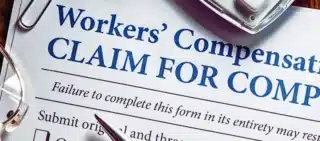
Common Reasons an Employer Won't Report Your Work Injury A total of 101,400 non-fatal work-related injuries and illnesses occurred in...


With workplace wellness topics gaining traction, workers may wonder, “does workers’ comp cover mental health in Chicago, Illinois?” Just like physical work-related injuries, mental health issues like anxiety, depression, or PTSD might affect your wellness and productivity. Your mental health condition must be caused or worsened by your job to qualify for compensation under the workers’ comp insurance system. You must provide medical evidence proving the link between your job and your condition.
After a work-related mental health condition occurs, inform your employer of your intent to file. Gather medical records and evidence supporting your claim. Hire a workers’ compensation attorney for the guidance and representation necessary to recover compensation through a workers’ comp settlement.

Mental health conditions, including depression, anxiety, or stress, are becoming common in the workplace. These conditions can impact your productivity, relationships with colleagues, and overall wellness. However, more people are starting to talk openly about mental health in the workplace.
Many companies recognize the importance of supporting their employees' mental wellness. As such, there are things you can do to take care of your mental health at work. Many companies offer employee assistance programs for confidential counseling and support services.
Workplaces are a breeding ground for stress, anxiety, and other serious mental health issues. A study found that 77% of workers have experienced work-related stress. 57% of these workers experienced stress associated with work-related burnout, like emotional exhaustion, lack of motivation, lower productivity, and irritability.
Stress is the most common mental health concern. Constant pressure can lead to burnout, decreased productivity, and physical health problems. Anxiety follows close behind and is often triggered by factors like job insecurity, demanding workloads, and toxic work environments.
Depression is another common mental health condition workers experience. It impacts their mood, energy levels, and motivation. If untreated, depression can lead to absenteeism, presenteeism (where one is physically present, but mentally absent), and difficulty meeting deadlines.
While it's often associated with combat, Post-Traumatic Stress Disorder can also arise from traumatic workplace experiences. For example, these experiences may include bullying, harassment, or witnessing violence. PTSD symptoms include hyperarousal, difficulty concentrating, and intrusive thoughts.
When stressed, anxious, or depressed, things that were easy before, like focusing, remembering details, or making decisions, become harder. Mental health struggles can zap your energy, making it hard to stay motivated and productive. You might struggle to meet deadlines, miss work more often, or put in less effort even if you want to do well.
Mental health issues can affect your interactions with colleagues. You might be irritable, withdrawn, or easily frustrated, hindering collaboration and communication. Being less sociable can hurt team morale and project outcomes.
Developing new ideas or solving problems creatively becomes more challenging when your mind is clouded with intrusive thoughts. You might feel less engaged or enthusiastic about your work., which could affect your innovation and performance.
Work stresses can worsen mental health issues and vice versa. It's a vicious cycle that can leave you feeling overwhelmed and unable to cope. The stresses can lead to presenteeism, which can decrease your quality of work and hinder recovery.
Illinois workers' compensation laws recognize mental health injuries alongside physical ones. Therefore, if your job directly caused or worsened your mental health condition, you may be eligible for benefits.
Insurance companies treat mental health claims no differently than physical injury claims because Illinois law requires them to do so. As such, your mental health treatment should be covered with your physical healthcare.
Even with this legal requirement, there are some specific rules you need to know. These rules revolve around causation, medical evidence, and laws that apply to mental health conditions. Here's an overview:
Mental health claims under Illinois worker's compensation are about cause and effect. As such, your mental health issue must be directly caused by your job duties or worsened by work-related experiences. For instance, this could be due to:
You need strong medical evidence to back up your claim. So, get a diagnosis from a doctor or therapist qualified to assess work-related mental health issues. The medical professional can help build a case by documenting your symptoms, the work factors responsible, and how your job has impacted your mental health.
There’s a limited timeframe to inform your employer and file a claim. Illinois law outlines mental health conditions eligible for workers’ comp. Your symptoms must be serious enough to affect your ability to work to qualify for benefits.
The more evidence you have, the stronger your claim, and the better your chances of recouping from the workers’ comp settlement chart. So, gather everything that supports your case. You should also navigate the process with a lawyer who will handle the legal tasks as you focus on recovery.
File a workers' compensation claim in Chicago, Illinois, to access treatment and support. The treatment and support will be ideal if work-related stress or trauma impacted your mental health. Follow these steps to file a mental health claim for workers’ compensation.
Tell your supervisor or HR representative about your mental or behavioral health and your intention to file a claim. Don't worry about precise details; just state your intention clearly. Your employer might provide information or forms to get started or make a decision.
Collect all past and present medical documents related to your mental health, including diagnoses, treatment notes, and medication prescriptions. Highlight entries that connect your condition to work stress or trauma. If anyone witnessed incidents at work that triggered your condition, get their written statements with their contact details.
Workers' compensation attorneys with a background in handling mental health can help you identify laws, statutes, and precedents related to your case. They can also help you file your claim correctly.
Obtain the appropriate claim form from your employer or the Illinois Workers' Compensation Commission (IWCCO) website. Fill it out with your details, the date of your injury, and a brief explanation of your claim. Afterward, attach all collected evidence and witness statements and submit the completed claim form to the IWCCO or follow your attorney's instructions.
The IWCCO will review your claim once you submit it. The review process might involve an investigation and medical evaluation. So, be prepared to answer questions and provide additional information if needed.
Your employer's insurance company may deny your claim. Your attorney will advise you on the best action, and help you answer the question, “What if my workers' comp claim is denied?” The attorney can represent you during hearings and negotiations. Be patient, follow your attorney's advice, and stay informed about the progress of your case.
Strong evidence will strengthen your case. It should include medical records and documentation that link work to your condition. Expert opinions can also serve as evidence when pursuing a mental health claim.
Medical records, like therapist notes and psychiatric evaluations, establish your condition and its severity. Records from before your injury can show a lack of pre-existing mental health issues. Other medical documents, such as those tracking your hospital visits, medications, and progress, can demonstrate ongoing and necessary care.
Incident reports, emails, or performance reviews detailing stressful events or harassment strengthen your claim. Witness statements corroborate your experiences with colleagues or supervisors who witnessed the work-related factors that affected your mental health. Diaries, journals, or notes documenting your symptoms and their connection to work stress can also be powerful evidence.
A detailed report from your treating physician should explain your diagnosis, link it to work factors, and recommend treatment. It forms part of the expert opinion needed to build your claim. The same applies to a vocational rehabilitation assessment, which can measure your work limitations and support the need for compensation or job modification.

Common Reasons an Employer Won't Report Your Work Injury A total of 101,400 non-fatal work-related injuries and illnesses occurred in...

At Strong Law Offices, we have a team of workers' compensation lawyers who understand the financial setbacks and physical limitations...

Common Equipment Involved in Run-Over Accidents Illinois job sites, from construction zones to industrial plants, depend on machinery to stay...